Smartnursing
i have essential guides that are A graded, feel free to leave a review.
thank you!
- 188
- 0
- 5
Community
- Followers
- Following
3 Reviews received
193 items
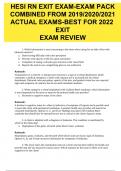
HESI RN EXIT EXAM-EXAM PACK COMBINED FROM 2019/2020/2021 ACTUAL EXAMS-BEST FOR 2022 EXIT EXAM REVIEW
1. Which information is most concerning to the nurse when caring for an older client with bilateral cataracts? a. States having difficulty with color perception b. Presents with opacity of the lens upon assessment c. Complains of seeing a cobweb-type structure in the visual field d. Reports the need to use a magnifying glass to see small print Rationale: Visualization of a cobweb- or hairnet-type structure is a sign of a retinal detachment, which constitutes a medical emergency. C...
- Exam (elaborations)
- • 325 pages •
1. Which information is most concerning to the nurse when caring for an older client with bilateral cataracts? a. States having difficulty with color perception b. Presents with opacity of the lens upon assessment c. Complains of seeing a cobweb-type structure in the visual field d. Reports the need to use a magnifying glass to see small print Rationale: Visualization of a cobweb- or hairnet-type structure is a sign of a retinal detachment, which constitutes a medical emergency. C...
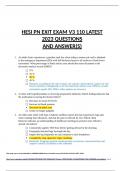
HESI PN EXIT EXAM V3 110 LATEST 2023 QUESTIONS AND ANSWER(S)
1. An adult client experiences a gasoline tank fire when riding a motorcycle and is admitted to the emergency department (ED) with full thickness burns to all surfaces of both lower extremities. What percentage of body surface area should the nurse document in the electronic medical record (EMR)? □ 9 % □ 18 % • 36 % □ 45 % □ Rational: according to the rule of nines, the anterior and posterior surfaces of one lower extremity is designated as 18 %of total body surface area (TBSA...
- Exam (elaborations)
- • 5 pages •
1. An adult client experiences a gasoline tank fire when riding a motorcycle and is admitted to the emergency department (ED) with full thickness burns to all surfaces of both lower extremities. What percentage of body surface area should the nurse document in the electronic medical record (EMR)? □ 9 % □ 18 % • 36 % □ 45 % □ Rational: according to the rule of nines, the anterior and posterior surfaces of one lower extremity is designated as 18 %of total body surface area (TBSA...
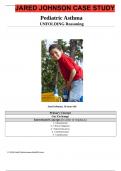
Pediatric Asthma FUNDAMENTAL Reasoning - Jared Johnson, 10 years old(complete answered solution)
of Present Problem: Jared Johnson is a 10 year-old African-American boy with a history of moderate persistent asthma. He is being admitted to the pediatric unit of the hospital from the walk-in clinic with an acute asthma exacerbation. Jared started complaining of increased chest tightness and shortness of breath one day prior to admission. He has been at 50 percent of his personal best measurement for his peak expiratory flow (PEF) meter reading which did not improve with the use of albut...
- Case
- • 12 pages •
of Present Problem: Jared Johnson is a 10 year-old African-American boy with a history of moderate persistent asthma. He is being admitted to the pediatric unit of the hospital from the walk-in clinic with an acute asthma exacerbation. Jared started complaining of increased chest tightness and shortness of breath one day prior to admission. He has been at 50 percent of his personal best measurement for his peak expiratory flow (PEF) meter reading which did not improve with the use of albut...
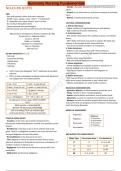
Summary Nursing Fundamentals Nclex-RN Cheat Sheet Complete Summer 2023.
TIPS: - Deal with patients rather than with machines. - AVOID: never, always, must, “why?”, “I understand”. - If 2 opposites (e.g. hyper-/hypo-), one is correct. - Do not leave the patient alone. - Choose physical over psychological. - IDK the answer: pick the one with the most information. ABC (except in emergencies, distress situations & CPR) Assessment vs. Implementation Acute vs. Chronic Stable vs. Unstable Expected vs. Unexpected Real vs. Potential Odd man out DO NOT D...
- Book
- Summary
- • 14 pages •
TIPS: - Deal with patients rather than with machines. - AVOID: never, always, must, “why?”, “I understand”. - If 2 opposites (e.g. hyper-/hypo-), one is correct. - Do not leave the patient alone. - Choose physical over psychological. - IDK the answer: pick the one with the most information. ABC (except in emergencies, distress situations & CPR) Assessment vs. Implementation Acute vs. Chronic Stable vs. Unstable Expected vs. Unexpected Real vs. Potential Odd man out DO NOT D...
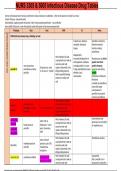
NURS 3305 & 5005 Infectious Disease Drug Tables.
L CELL WALL IN HIBIT O RS PENICILLINS (and related drug)- Inhibiting cell wall penicillin G narrow-spectrum penicillinase sensitive penicillin Streptococcus; many G+ & some G- ; Syphilis MOA: Weaken Cell wall, causing bacteria to take up excessive water and rupture. Bactericidal, only killing dividing bacteria. Bind to penicillin binding proteins to weaken cell wall. GI heart burn, diarrhea, stomatitis, discolored tongue, Multiple DDI’s Increased bleeding time of antico...
- Other
- • 8 pages •
L CELL WALL IN HIBIT O RS PENICILLINS (and related drug)- Inhibiting cell wall penicillin G narrow-spectrum penicillinase sensitive penicillin Streptococcus; many G+ & some G- ; Syphilis MOA: Weaken Cell wall, causing bacteria to take up excessive water and rupture. Bactericidal, only killing dividing bacteria. Bind to penicillin binding proteins to weaken cell wall. GI heart burn, diarrhea, stomatitis, discolored tongue, Multiple DDI’s Increased bleeding time of antico...
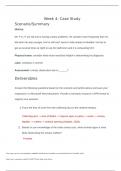
Case Study Week 4: Urinary System
History: Mr. P is 77 yrs old and is having urinary problems. He urinates more frequently than he did when he was younger, but he still can't seem to fully empty his bladder. He has to get up several times at night to use the bathroom and it is exhausting him! Physical exam: consider what exam would be helpful in determining his diagnosis Labs: urinalysis is normal Assessment: Urinary obstruction due to ______? Deliverables Answer the following questions based on the scenario and article...
- Case
- • 3 pages •
History: Mr. P is 77 yrs old and is having urinary problems. He urinates more frequently than he did when he was younger, but he still can't seem to fully empty his bladder. He has to get up several times at night to use the bathroom and it is exhausting him! Physical exam: consider what exam would be helpful in determining his diagnosis Labs: urinalysis is normal Assessment: Urinary obstruction due to ______? Deliverables Answer the following questions based on the scenario and article...
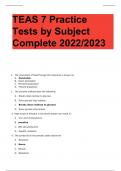
TEAS 7 Practice Tests by Subject Complete A+ guide
1. The movement of food through the intestines is known as: A. Peristalsis B. Ileum translation C. Microvilli propulsion D. Flexure propulsion 2. The enzyme maltase does the following: A. Breaks down lactose to glucose B. Turns glucose into maltose C. Breaks down maltose to glucose D. Turns glucose into lactose 3. High levels of bilirubin in the blood stream can result in: A. Uric acid overexposure B. Jaundice C. Bile salt production D. Hepatic mutation 4. The symbol B on the peri...
- Book
- Exam (elaborations)
- • 346 pages •
1. The movement of food through the intestines is known as: A. Peristalsis B. Ileum translation C. Microvilli propulsion D. Flexure propulsion 2. The enzyme maltase does the following: A. Breaks down lactose to glucose B. Turns glucose into maltose C. Breaks down maltose to glucose D. Turns glucose into lactose 3. High levels of bilirubin in the blood stream can result in: A. Uric acid overexposure B. Jaundice C. Bile salt production D. Hepatic mutation 4. The symbol B on the peri...
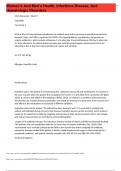
Women’s And Men’s Health, Infectious Disease, And Hematologic Disorders Main discussion - Week 9 COLLAPSE Case Study
Main discussion - Week 9 COLLAPSE Case Study 1 HH is a 68 yo M who has been admitted to the medical ward with community-acquired pneumonia for the past 3 days. His PMH is significant for COPD, HTN, hyperlipidemia, and diabetes. He remains on empiric antibiotics, which include ceftriaxone 1 g IV qday (day 3) and azithromycin 500 mg IV qday (day 3). Since admission, his clinical status has improved, with decreased oxygen requirements. He is not tolerating a diet at this time with compla...
- Other
- • 3 pages •
Main discussion - Week 9 COLLAPSE Case Study 1 HH is a 68 yo M who has been admitted to the medical ward with community-acquired pneumonia for the past 3 days. His PMH is significant for COPD, HTN, hyperlipidemia, and diabetes. He remains on empiric antibiotics, which include ceftriaxone 1 g IV qday (day 3) and azithromycin 500 mg IV qday (day 3). Since admission, his clinical status has improved, with decreased oxygen requirements. He is not tolerating a diet at this time with compla...
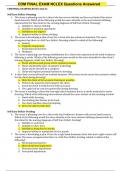
CDM FINAL EXAM NCLEX Questions Answered Summer 2023.
Self Care Deficit: Dressing 1. The nurse is planning care for a client who has severe arthritis and has very limited fine motor hand dexterity. Which of the following would the nurse identify as the most relevant defining characteristic for this client for the nursing diagnosis of Self-Care Deficit: Dressing? a. Inability to choose clothing b. Inability to maintain appearance c. Inability to use zippers d. Impaired ability to obtain clothing 2. The nurse is developing a plan of care for ...
- Exam (elaborations)
- • 10 pages •
Self Care Deficit: Dressing 1. The nurse is planning care for a client who has severe arthritis and has very limited fine motor hand dexterity. Which of the following would the nurse identify as the most relevant defining characteristic for this client for the nursing diagnosis of Self-Care Deficit: Dressing? a. Inability to choose clothing b. Inability to maintain appearance c. Inability to use zippers d. Impaired ability to obtain clothing 2. The nurse is developing a plan of care for ...

Keiser University ATI NURSING PHARMACOLOGY Exam guide.
Diabetes hydrochlorothiazide teaching? Hydrochlorothiazide therapy can elevate blood glucose Pharm action: blocks reabsorption of sodium and chloride, and prevents reabsorption of water Ther use: hypertension, heart failure, liver and kidney disease Complications: dehydration, hypokalemia, hyperglycemia Nursing admin: monitor electrolytes, take first thing in am, consume foods high in potassium and maintain adequate fluid intake, weigh clients same time each day, monitor ...
- Other
- • 8 pages •
Diabetes hydrochlorothiazide teaching? Hydrochlorothiazide therapy can elevate blood glucose Pharm action: blocks reabsorption of sodium and chloride, and prevents reabsorption of water Ther use: hypertension, heart failure, liver and kidney disease Complications: dehydration, hypokalemia, hyperglycemia Nursing admin: monitor electrolytes, take first thing in am, consume foods high in potassium and maintain adequate fluid intake, weigh clients same time each day, monitor ...

Test Bank for Canadian Fundamentals of Nursing, 6th Edition| Test Bank for Canadian Fundamentals of Nursing 6th Edition by Potter > all chapters 1-48 (questions & answers) A+ guide.
i do not advice anyone to buy this test bank. it is useless
Edward Carter Shadow Health-Unguided Intermediate Patient Case Results
NSG 6005 midterm